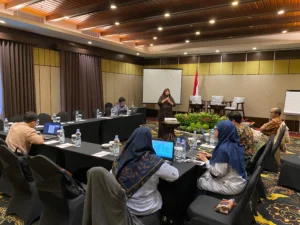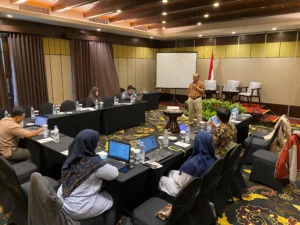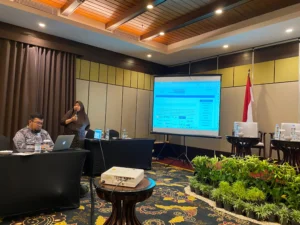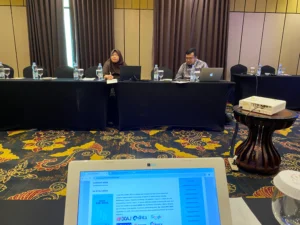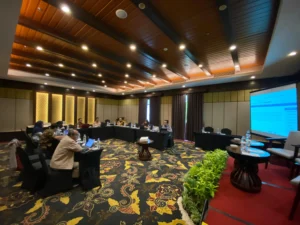 The Jurnal ILMU DASAR (JID) Faculty of Mathematics and Natural Sciences at Jember University held a workshop with the theme Peningkatan Status SINTA Melalui Peningkatan Substansi Artikel dan Gaya Penulisan at El Royal Banyuwangi (20-21/7). Andista Candra Yusro, S.Pd., M.Pd., Deputy Chair of Indonesian Journal Volunteers, DOAJ Associate Editor, and ARJUNA Assessor, accompanied and dissected JID from management to substance. Chief Editor: JID Purwatiningsih, S.Si., M.Si., Ph.D. We hope that the guidance of the presenters can make JID ready to rise to SINTA status and have an international reputation. “We ask for guidance, Mas Yusro, so that JID can rise in the SINTA ranking and achieve Scopus,” she said in front of the JID editor, who was present with the full team.
The Jurnal ILMU DASAR (JID) Faculty of Mathematics and Natural Sciences at Jember University held a workshop with the theme Peningkatan Status SINTA Melalui Peningkatan Substansi Artikel dan Gaya Penulisan at El Royal Banyuwangi (20-21/7). Andista Candra Yusro, S.Pd., M.Pd., Deputy Chair of Indonesian Journal Volunteers, DOAJ Associate Editor, and ARJUNA Assessor, accompanied and dissected JID from management to substance. Chief Editor: JID Purwatiningsih, S.Si., M.Si., Ph.D. We hope that the guidance of the presenters can make JID ready to rise to SINTA status and have an international reputation. “We ask for guidance, Mas Yusro, so that JID can rise in the SINTA ranking and achieve Scopus,” she said in front of the JID editor, who was present with the full team.
Before the workshop, Drs. Siswoyo, M.Sc., Ph.D., lined up to open the event and tell about the beginning of the Jurnal ILMU DASAR until it received SINTA status and was indexed by DOAJ. “At the beginning, JID was still a print edition; then it became an online edition and became the initial journals at UNEJ; now JID has achieved SINTA 3, and DOAJ is the result of the work of a solid team of editors,” he said. The workshop began by showing a portrait of JID’s final condition and preparations for publishing the final issue by JID’s chief editor. “Based on the current conditions, after this, Mas Yusro can help us update the JID, especially the article substance and writing style,” hoped Purwatiningsih.
Andista Candra Yusro, familiarly called Mas Yusro, started the JID operation from the home page and menus on JID. “We first tidy up the management section, especially the front page display, menu contents such as editorial team, scopes, author guidelines, peer review process, supporting files, and later article templates, which will be related to the substance and style of article writing,” he started. The changes are aimed at preparing the Jurnal ILMU DASAR to achieve Scopus in the future and increasing SINTA’s ranking in the near future. In between, there were also several warm discussions between the presenters and the JID team regarding the use of supporting applications such as Tunitin to check plagiarism as well as Mendeley or Zotero for references.
The instructions from the presenters were immediately carried out with changes on the OJS side by the JID team. The scope, for example, was immediately changed according to the team agreement to be explained by each section editor at OJS. Other management was also immediately changed at Mas Yusro’s direction. “After management, we proceed to the template. We formulate it together from the title, article writing format, and later references. This is important for later when applying for Scopus,” explained Mas Yusro while giving examples of several journals that have just successfully achieved Scopus.
Mas Yusro also touched on the assessment criteria that will be changed at ARJUNA. “The formulation is not yet complete, but there are changes to the criteria in ARJUNA; we are just preparing it; in fact, with the preparations we are making now, we can submit the Scopus application,” he said. To get to Scopus, JID must be fulfilled, starting with improving the quality of articles. Writers must be from several countries, and editors and reviewers involved are also prioritized from several countries. “If JID meets that, we submit it, and a few months later we can get Scopus, then SINTA will achieve the highest ranking,” he concluded.

